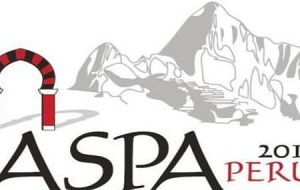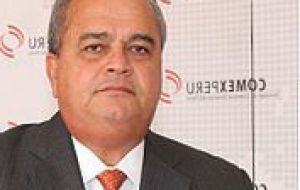MercoPress. South Atlantic News Agency
The 34-country Arab League/Unasur political and trade summit takes off in Peru

 The parallel trade summit has attracted CEO and general managers from 140 companies said Carlos Chiappori Samengo
The parallel trade summit has attracted CEO and general managers from 140 companies said Carlos Chiappori Samengo President Cristina Fernández leaves Monday evening for Peru to participate in the 3rd Summit of South American-Arab Countries (ASPA) leaders, scheduled to take place on October 1st and 2nd in the Ministry of Culture, in the Peruvian capital Lima.
The meeting will be preceded, as it usually happens in this type of meetings, by a meeting of all Foreign Ministers of the countries involved.
According to Buenos Aires sources President Cristina Fernandez will try and obtain an explicit statement from the ASPA meeting supporting Argentina’s sovereignty claims over the Falklands/Malvinas Islands. Foreign Minister Hector Timerman is already in Lima working with his peers.
At the summit, the ASPA countries are expected to reach agreements on improving political relations, increasing commercial ties and achieving larger investments between the South-South bloc and the rest of the world.
The “Declaration of Lima,” which calls for finding a peaceful solution to international conflicts, promoting both regions as nuclear-weapon-free zones and furthering economic ties, will be given a final touch by foreign ministers during the ASPA Council of Foreign Ministries' Meeting on Monday.
Peruvian diplomatic sources said the document was reviewed in the last days by the foreign ministries of both regions during the United Nations General Assembly, held in New York.
It is expected that ASPA heads of state and government will sign the declaration as the ASPA summit's final declaration at the close of the summit.
Political issues will also be included on the summit agenda, especially the ongoing internal conflict in Syria, its effects on its Middle East neighbours, and the wave of violent protests sparked by an anti-Islamic film made in the United States. Participants may also discuss the need of reforming the United Nations system, especially the overriding power held by its Security Council.
Parallel to the political meeting business people from South America and the Arab countries will be meeting to discuss trade and investments.
Host of the CEO summit Carlos Chiappori Samengo said presidents and top managers from some 140 companies in the fields of energy and mining, agriculture, technology and banking, among others, have confirmed to attend the business meeting.
They are expected to share experiences and discuss investments in such areas as “infrastructure, telecommunications, energy, services, tourism and trade, with an emphasis on agribusiness,” said the host, who is also the chairman of Peru's Foreign Trade Society.
The CEO summit will allow “participants to establish business contacts and serve as a bi-regional trade platform,” said Julio Florian, Peruvian ambassador to Qatar.
Peru has geared up to showcase its investment opportunities to oil-rich Arab states, Florian said, adding that Peru had some 26 public-sector projects lined up for 2012-2013, including the construction of airports and gas supply networks, that could draw potential investors.
Speaking of the ASPA summit, Peruvian President Ollanta Humala told local media “the Arab world is looking to see where they can invest and they have seen that Latin America offers the best conditions for investment.”
ASPA was created upon the initiative from former Brazilian President Lula da Silva following his December 2003 tour of Arab nations. The bi-regional group was formally established in 2004 with the help of the Union of South American Nations (Unasur) and the Arab League. It is composed of 34 member states, with 12 South American countries and 22 Arab countries. The first ASPA Summit was held in Brazil in 2007 and was continued in Doha, Qatar, in 2009.
Trade between the two regions has nearly tripled after ASPA creation, up from 11 billion US dollars to 30 billion dollars in 2008.
Thirteen heads of state and government among ASPA 34 member-countries will attend this year's summit, including Jordan, Lebanon, Tunisia, Qatar, Argentina, Brazil, Colombia, Chile and host Peru.




Top Comments
Disclaimer & comment rules-

-

-

Read all commentsThe Arab world has a lot more to learn from South America than North America =)
Oct 01st, 2012 - 07:37 am 0How to borrow and never repay. How to cheat. How to lie. How to kill. How to steal.
Oct 01st, 2012 - 10:34 am 0|1|
Oct 01st, 2012 - 01:46 pm 0A wise man will learn from his enemies.
Commenting for this story is now closed.
If you have a Facebook account, become a fan and comment on our Facebook Page!